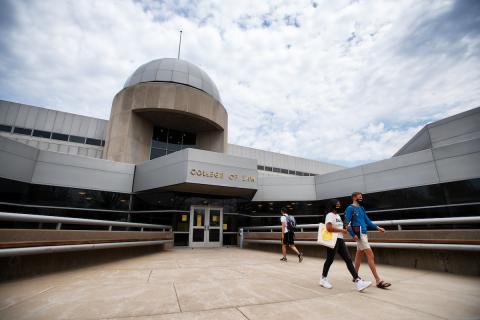

What work will I do in CELP?
You will work with a team of two-three law students and one undergraduate student to assist a client with a complex, ill-defined problem. CELP is unique in that you will initiate the representation and close the representation in one semester, giving you the opportunity to see the full arc of the project, not just small pieces or tasks. We focus on a model of representation that is collaborative and non-hierarchical and takes full account of the client and community’s strengths, needs, and aspirations.
You will design a project plan, conduct all legal and factual research, interview relevant stakeholders, counsel your client, make strategic choices, and design and create the final deliverable.
How many credits should I take?
If you will be in two practice groups, you are strongly encouraged to take 9 credits of clinic, allowing you to commit at least 4.5 credits or approximately 18 hours/week to your CELP client. You may, with the instructor's permission, enroll in only CELP for 6 credits.
Can I do CELP and a different Clinic group as well?
The Law Clinic functions like a single law firm with six distinct practice groups: Federal Criminal Defense, Civil & Employment Litigation, Estate Planning, Law & Policy in Action, Immigration, and the Community Empowerment Law Project. The Legal Clinic is unique in that students can choose to focus on one area of law or explore different interests by participating in two practice groups.
Work with Professor Fisher Page to determine if working in two practice groups at once is a good fit with your law school and career goals.
Application Information
For additional information on how to register, including the application, please click here.
What do we do in seminar?
Seminar will typically meet for two hours each week. In addition to learning and practicing fundamental lawyering skills like interviewing and counseling, you will also learn skills that relate specifically to CELP’s work, like project planning and the ethics and complexities of organizational representation.
We will also grapple with larger questions that underlie all of our lawyering:
- How does my client define justice and how do I define it?
- What is the legal system’s role in creating, perpetuating, and/or dismantling inequality?
- What model of lawyering do I aspire to practice?
- How does my choice of clients and my approach to lawyering engage the community?
- What professional/career choices am I making and why?
- Can I build a legal career and a life that reflect my personal morals and commitment to justice?
What is “supervision”?
Each project team will meet with their supervising attorney for a minimum of one hour per week to discuss whatever the team feels is most important that week. The project team sets the agenda for supervision and leads the conversation. Supervision meetings could focus on anything from how to present new developments to the client, to mooting an interview, to resolving a collaboration issue within the team.
Student Learning Goals
Skills
-
Observe, listen, and read with attention to detail
-
Interview clients and third-parties
-
Plan and manage a project/transaction
-
Develop broad and creative research skills
-
Develop a case/project theory
-
Establish proficiency in oral, written, and visual advocacy for diverse audiences
-
Counsel clients effectively
-
Learn and use collaborative and interdisciplinary skills and vocabulary
-
Practice in a professional and ethical manner
Competencies
-
Understand and develop tools to navigate the complexity of organizational representation
-
Analyze the complex strategic choices made by organizations regarding their services, advocacy, and capacity and examine the relationship between funders, organizations, and the communities they serve
-
Think broadly and critically about the tools – legal and non-legal – available to further social justice and the strategic risks and benefits of using those tools in a given context
-
Understand legal representation as a form of problem solving, and use approaches to problem mapping, solution generation, and solution assessment from multiple disciplines/professions
-
Build the skills to translate the narratives of litigation and individual experiences into community empowerment, systemic change, and effective drafting
-
Develop an awareness of how privilege, implicit bias(es), and emotions impact lawyering
-
Become a reflective practitioner and individual, who understands and grapples with their role as an agent of social justice/change, both professionally and personally
-
Adapt and transfer skills and learning from one context to another
-
Recognize and deepen a commitment to life-long learning from individuals of diverse experiences and education
Community/Client Goals
-
Provide holistic and interdisciplinary representation (and referrals) for organizations
-
Encourage a view of lawyers as collaborative, equal partners and problem-solvers
-
Increase access to legal, social, and other services and economic opportunities for low-income and/or marginalized communities (women, POC, immigrants, Native Americans)
-
Amplify client and community voices in the Iowa City legal, political, and business landscape
-
Assist clients and communities to build new relationships and alliances beyond issue area, geographic or community focus